Meet ‘Bob Smith,’ The Fake Facebook Profile Memphis Police Allegedly Used To Spy On Black Activists
New records obtained by the Appeal show the account seems to have been monitoring Black Lives Matter activists for years.
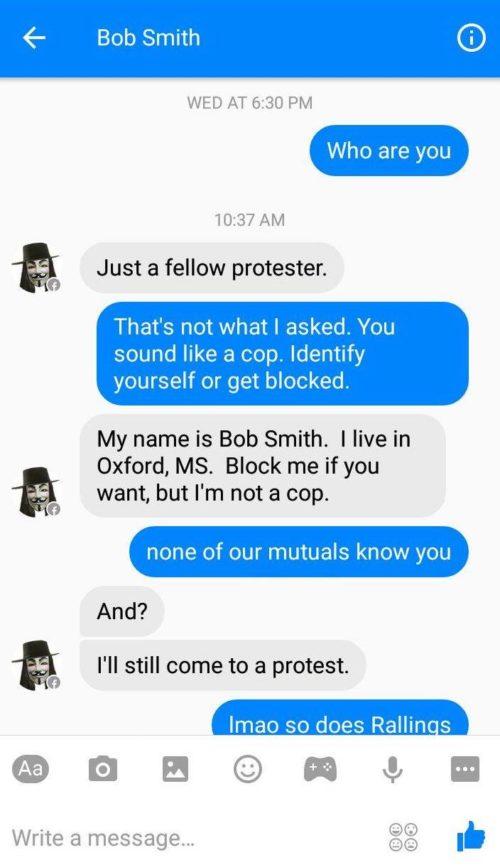
Last week, The Appeal broke news on documents revealing that Memphis police were surveilling Black Lives Matter activists and distributing dossiers on individual protesters among law enforcement. Among the revelations was the discovery that the Memphis police appear to have used a fake Facebook profile named “Bob Smith” to befriend and gather information from these activists’ private social media posts.
The Appeal has now obtained screenshots of interactions that this alleged police account has had with multiple activists. The records show that the account, at times, gave activists contradictory information and sought to gain their trust.
The police department was confronted with the “Bob Smith” account in an April 2018 deposition for the ACLU of Tennessee’s lawsuit over the surveillance. During the deposition of a police officer who had engaged in surveillance operations, the city’s lawyer claimed answering questions about the “Bob Smith” account might disrupt past, present, or future police investigations.
When an ACLU attorney asked point blank if it was a police account, the officer’s lawyer declared that they would not allow any testimony “on the details as to how the Bob Smith account is employed by the Memphis Police Department.” Later when the ACLU asked about whether a police officer had other social media accounts beyond those he used personally, his lawyer again insisted he not answer because that would get “into the details potentially of the Bob Smith account.”
The account appears to have tracked activists for years. Facebook messages obtained by The Appeal, show that Bob Smith was friending activists as early as August 2015. One activist, who wished to remain anonymous citing fears of further police scrutiny, said that they received a friend request from Smith as late as February 2017, around the time of protests over President Trump’s travel ban.
In one June 2016 Facebook Messenger conversation with another activist, reviewed by The Appeal, the account claimed to be “Tim Ryan” from “Fayette County.” In their conversation, the account said that he was politically to the “left of Bernie,” referring to U.S. Senator Bernie Sanders of Vermont, and even referenced other Memphis activists in an apparent effort to gain trust and access. The activist responded, “Fuck yes. I’ve been seeking like minded thinkers locally. It’s a relief to know they’re out there.” In a phone call, the activist, who requested anonymity citing personal safety concerns, confirmed that he eventually accepted the friend request. Two months after the conversation in which “Bob Smith” said he was “Tim Ryan,” this activist was arrested at a Black Lives Matter protest for “criminal trespass.”
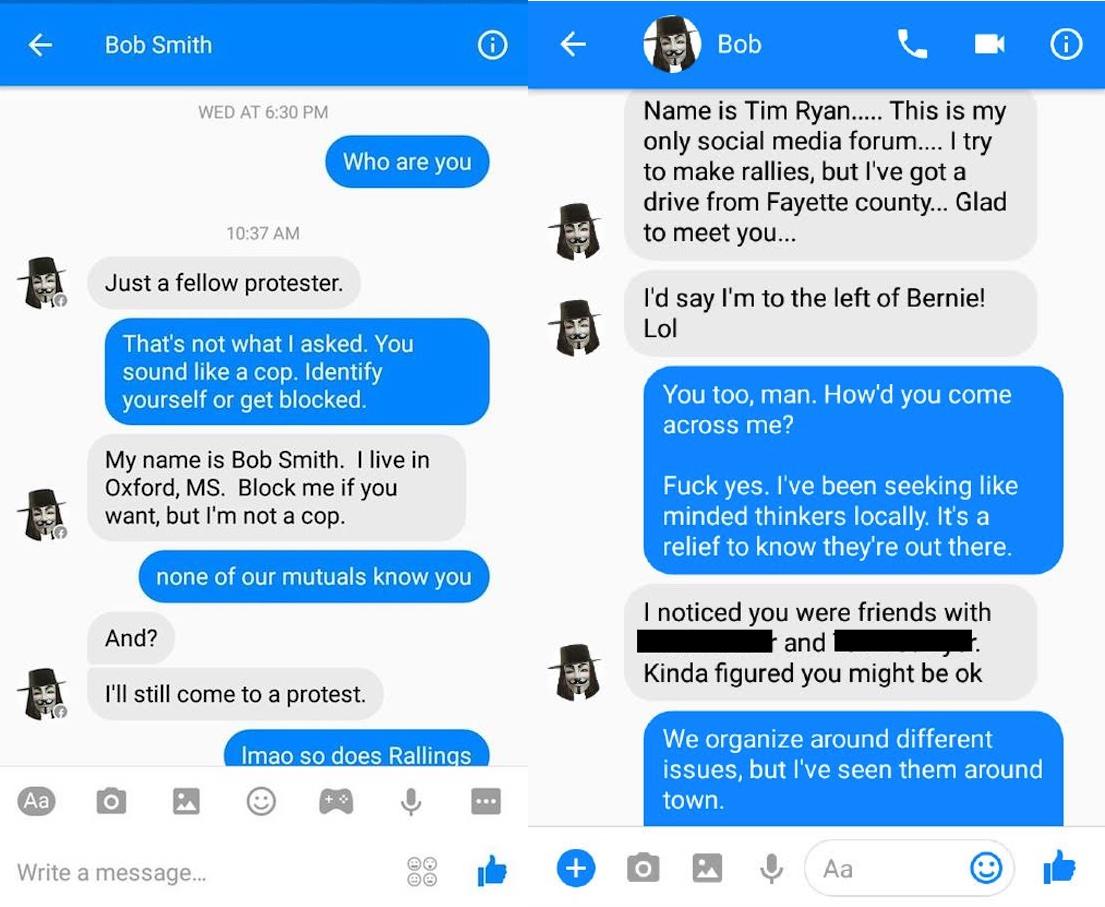
Activists suspect that this “Tim Ryan” account is operated by Memphis police detective Timothy Reynolds. The released police documents also strongly suggest Reynolds’s involvement with the account. The records show that Reynolds was able to see and identify an activist’s private Facebook post, which he then forwarded to a colleague to screenshot. In court, Reynolds said his personal social media accounts are “locked down” and are “mainly police officers and college buddies.” Because of this, Reynolds’s personal account may not have been able to access such a private post, but “Bob Smith,” a Facebook friend with many activists, could have.
The court documents also note that Reynolds and a partner were the primary agents leading the department’s social media protest monitoring efforts. Beyond tracking activists and their associates, Reynolds went so far to acquire an undercover cell phone, which he used to contact the same activist that “Bob Smith” friended, while calling himself “Tim Ryan,” according to the documents.
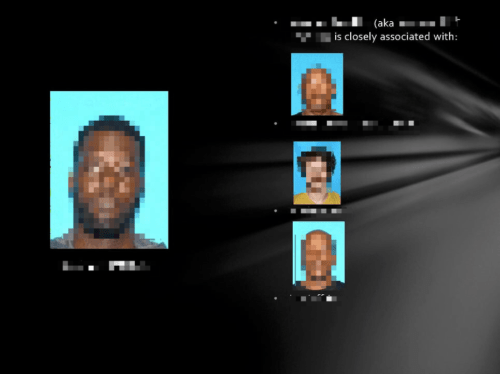
The Memphis Police Department declined to respond to The Appeal’s questions about Reynolds’s alleged involvement in the Bob Smith account and other questions about the account’s activities.
In a 2017 interaction with another activist, however, this Bob Smith/ “Tim Ryan” account contradicted his earlier claims. To this activist, he claimed to be from Oxford, Mississippi, and did not give the name “Tim Ryan” when asked, simply calling himself a “fellow protester” and insisting that he was not a cop.
Despite these seemingly clumsy techniques, Memphis organizer Keedran Franklin told The Appeal that several activists let their guard down, as they were getting a flood of friend requests at the height of police brutality protests in 2016. “A lot was going on in the bridge protest, so people got into this culture of accepting friends without checking,” Franklin said in a phone interview. He said that instilling a culture of digital security has become a major emphasis in the activist community since then. “So people would trust it because of their mutuals in the social justice world.”
This approach may have allowed Memphis police to further track the activist community. According to the police deposition documents, as The Appeal previously reported, the Memphis police obtained a friends-only Facebook post of activist Paul Garner, who had recommended a Saul Alinsky book. The police then not only collected information on that post but the names of 58 friends who “liked” the post. In a phone call, Garner said he found such collateral collection one of the most “disturbing” parts of the revelations.
“These are people who just follow my posts and aren’t even actively involved but may support our work,” said Garner.
Asked why he accepted Bob Smith’s friend request, Garner said that he, like many, activists is always seeking to meet with like-minded progressive community members. “I’ve noticed that account liking my stuff over the last few years, and I’ve always assumed there are cops on my profile, many of whom I’ve blocked,” said Garner, referring to the Smith account, which he says is now blocked. “Since then I have been checking friend requests more.”
The first anonymous activist said their stance on security has also changed somewhat, but that their old attitude is still shared by many in their community. “Back in 2016, I was a little more lenient,” said the activist, who noted that they realized the dangers of surveillance during pipeline protest activities. “But even to this day I have 16 mutual friends with Bob Smith.”
The Facebook account describes Bob Smith as a “Protestant” and “anarchist.” Smith’s “liked” pages include several activist groups, such as Black Lives Matter groups and a Palestinian solidarity group. The account also “liked” the pages of a local historically Black Baptist church, Bernie Sanders, the Southern Poverty Law Center, I Love Being Black, and Red & Black Anarchists 2.
The account’s “events” page also included a variety of progressive demonstrations, including local police-reform group action in 2016 and labor-affiliated actions, such as a “$15 for Memphis” rally in 2015.
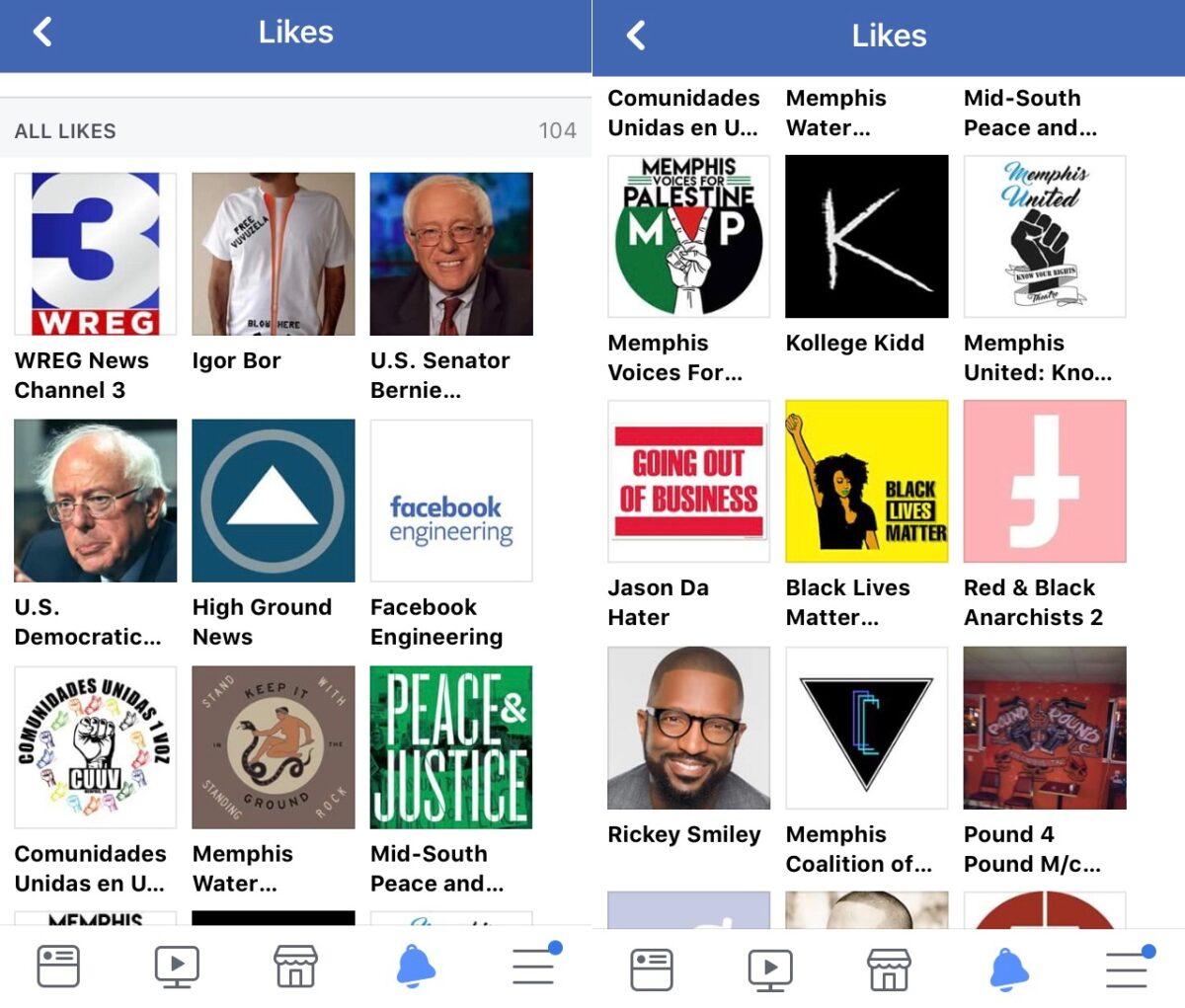
According to emails released by the city over the course of the ACLU’s litigation, social media surveillance helped police track activists in real time. A September 2016 email, for example, showed how police at Memphis’s Real Time Crime Center were updating each other on activists’ meeting locations.
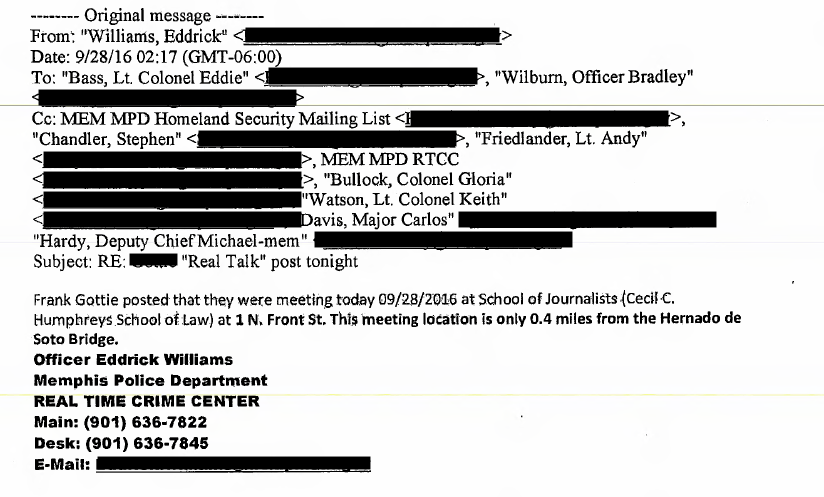
One of the anonymous activists interviewed by The Appeal said that this apparent online surveillance was disturbing, despite its sometimes clumsy execution.
“That can be hilarious when you’re talking to Bob Smith online,” said the Memphis activist. “But it’s terrifying when you see how they just arbitrarily decide that someone’s dangerous and then unlawfully surveil someone or their family or friends,” referring to the fact that police tracked not only activists’ posts but who had “liked” those posts on Facebook.
Franklin believes that the police tactics were intentionally harming the activist community. “They wanna scare people to silo out the movement, and that will happen as some people will sit back too scared to come around,” said Franklin. “To go after who is liking people’s posts, it makes me feel they are targeting our family and friends. They’re trying to get as many connections and contacts as they can.”
This dragnet community surveillance extended beyond activists, and into the larger Black community in Memphis, as Brentin Mock noted last week in CityLab. Authorities attended numerous events undercover, such as church meetings, food truck festivals, and a memorial service for Darrius Stewart (a 19-year-old killed by Memphis Police in 2015).
The revelations support many residents’ suspicions that some Memphis police do not want to work with Black residents and may even seek to harm them, said Tami Sawyer, a Democratic nominee for a seat on the Shelby County Commission, who was named at several points in the police surveillance documents.
“My parents have always been concerned if I’ve done work for Black Lives Matter or anti-Confederate statue protests,” Sawyer said in a phone interview. “Whenever I go out of the house, my dad says ‘you got your car lights working?’ , ‘you got your license?’ because he doesn’t trust that I’ll be kept safe. … That’s hard for me as a daughter to know my father knows I’m a target of the city for speaking up.”
The path forward, argued one of the activists, is not in trying to stop all police surveillance, a task he says is impossible, but to go forward knowing the risks. “There’s no way around surveillance,” he said in a phone call. “So you have to act being firm in your belief, being out there blatantly, being committed to your principles.”
